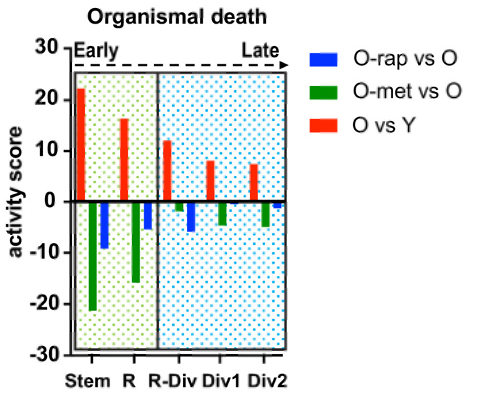Key Points:
- Both metformin and rapamycin reverse the reduction in intestinal stem cell proliferation seen in aged mice.
- Genes that increase when an organism dies, called “organismal death” genes, are elevated in older mice.
- Metformin outperforms rapamycin in reducing organismal death genes and other age-related genes in mice.
Thanks to our stem cells, most of our organs (save the heart and brain) have the remarkable capability of regenerating damaged or lost tissue. However, with age, this regenerative capacity declines, which is perhaps best exemplified by our intestinal tissue. Loss of intestinal regenerative capacity contributes to age-related intestinal disorders and could be related to increasing the risk of colorectal cancer.
Now researchers from the Albert Einstein College of Medicine in New York report findings in Aging Cell that suggest rapamycin and metformin could counter declining intestinal regenerative capacity. Choi and colleagues show that metformin and rapamycin increase intestinal stem cell (ISC) proliferation. Additionally, both drugs reduce age-related gene changes in ISCs, with metformin outperforming rapamycin.
Metformin and Rapamycin Rejuvenate Intestinal Stem Cells
Both metformin and rapamycin have been shown to extend mouse lifespan. Accordingly, Choi and colleagues fed one group of old (21 months of age) mice 0.1% metformin (O-met) and another group of old mice 42 ppm rapamycin (O-rap), which the authors state are life-extending doses. The O-met and O-rap mice were compared with old mice fed a normal diet and young mice (2 months of age) fed a normal diet.
To regenerate intestinal tissue, ISCs proliferate and then become adult intestinal cells through a series of cellular transformations. The researchers found that ISC proliferation was reduced in old mice fed a normal diet compared to young mice. However, O-met and O-rap mice showed an increase in proliferation, suggesting the partial restoration of regenerative capacity.

ISCs develop into different cell types before becoming mature adult intestinal cells. Choi and colleagues assessed the developmental trajectory of ISCs via gene analysis. The analysis, which is done with computer software programs, takes changes in gene activation and categorizes them. One of these categories is organismal death, which includes the genes activated after an organism dies.
The analysis showed an increase in organismal death genes, along with growth failure and cell death genes in older mice, consistent with deteriorating intestinal tissue function with age. Metformin and rapamycin treatment reversed these age-related gene changes in stem cells and early cell types along the developmental trajectory. Further along the trajectory, the efficacy of the two drugs diverged, with metformin being more effective in reversing the gene changes.

Could NMN Outperform Metformin and Rapamycin?
A previous study compared NMN with metformin and rapamycin, showing that all three anti-aging molecules had similar effects on improving cognitive performance in rats with obstructed blood flow. In terms of intestinal aging, NMN has been shown to counter intestinal wall decline in aged mice. While the effect of NMN on intestinal stem cells has not yet been studied, NMN has been shown to rejuvenate stem cells. Therefore, it is plausible that NMN could at least have similar effects to metformin and rapamycin on intestinal stem cell aging. However, a direct comparison is necessary.